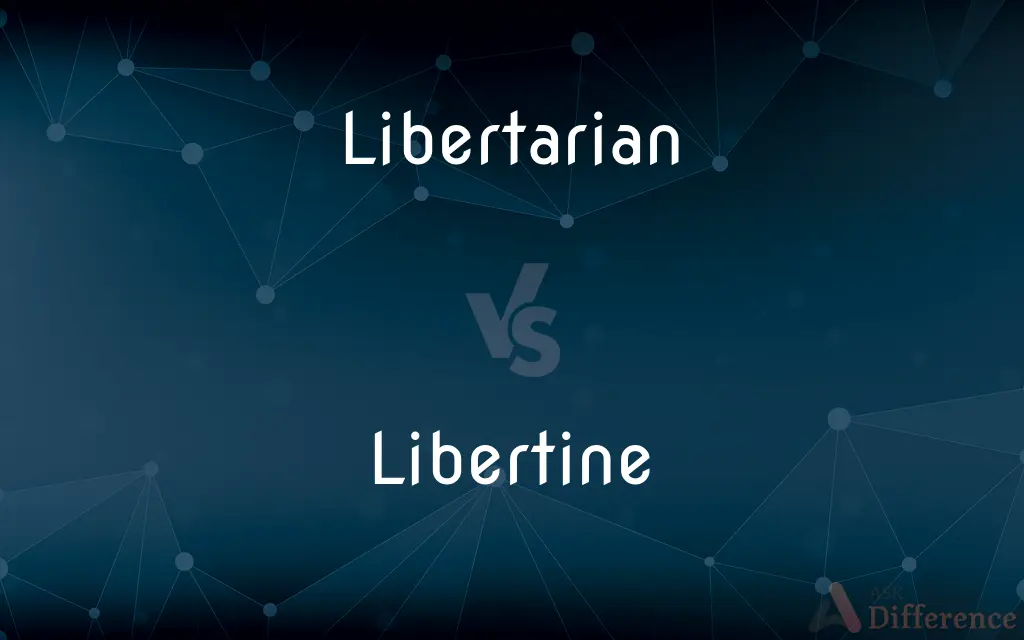Libertarian vs. Libertine — What's the Difference?
Edited by Tayyaba Rehman — By Fiza Rafique — Updated on April 16, 2024
Libertarianism focuses on political freedom and minimal government interference, whereas libertinism centers on personal freedom without moral constraints.

Difference Between Libertarian and Libertine
Table of Contents
ADVERTISEMENT
Key Differences
A libertarian advocates for individual liberty, particularly in political and economic contexts, emphasizing minimal government control and maximal personal autonomy. Whereas a libertine prioritizes personal freedom in moral matters, often disregarding conventional norms and ethics.
Libertarians typically support free-market capitalism, private property, and limited government intervention, seeing these as essential to individual freedom. On the other hand, libertinism is more concerned with personal lifestyle freedoms, especially the pursuit of pleasure unbounded by societal rules.
In political discourse, libertarianism is recognized as a formal ideology with structured principles that influence various global political parties and movements. In contrast, libertinism is less formalized, often viewed more as a lifestyle or personal philosophy than a political stance.
The ethical foundations of libertarianism are rooted in concepts of self-ownership and the non-aggression principle, which stipulate that individuals have the right to control their own lives so long as they do not harm others. Meanwhile, libertinism often challenges ethical boundaries, focusing on personal liberty to explore desires, sometimes at the expense of traditional moral values.
Libertarians are active in many political contexts, advocating for policies that reduce government size and increase individual responsibility. Libertines, however, are usually focused on cultural and personal realms, influencing arts, literature, and personal moral debates rather than public policy.
ADVERTISEMENT
Comparison Chart
Focus
Political and economic freedom
Personal freedom
Key Principles
Minimal government, free market
Pursuit of pleasure, moral freedom
Societal Impact
Political and economic policies
Cultural and moral norms
Ethical Basis
Self-ownership, non-aggression
Rejection of conventional morality
Typical Discourse
Political reform, legislation
Personal lifestyle, arts
Compare with Definitions
Libertarian
Advocating minimal state intervention in the personal and economic affairs of citizens.
A libertarian might argue for the deregulation of financial markets.
Libertine
Disregarding accepted rules or conventions, especially in moral conduct.
His libertine lifestyle shocked the conservative town.
Libertarian
A person who believes in the doctrine of free will.
As a libertarian, John believes in making his own choices without government interference.
Libertine
A person who is morally unrestrained.
The film depicts the libertine culture of the roaring twenties.
Libertarian
Opposing authoritarianism in governance.
Libertarian philosophers often critique the expansion of state power.
Libertine
Associated with freethinking in matters of religion.
The libertine thinkers of the Enlightenment challenged the church’s authority.
Libertarian
Supporting individual rights and civil liberties.
His libertarian views made him a strong advocate for privacy rights.
Libertine
A person who behaves without moral principles or a sense of responsibility.
The novel's protagonist is portrayed as a charismatic libertine.
Libertarian
A member of a political party advocating libertarian principles.
She campaigned for the Libertarian party during the elections.
Libertine
Someone who leads a life of revelry and often debauched behavior.
He was infamous for his libertine exploits across Europe.
Libertarian
An adherent of libertarianism
Libertarian philosophy
Libertine
A person, especially a man, who freely indulges in sensual pleasures without regard to moral principles
His image as an unbridled libertine is a total myth
Libertarian
A person who believes in free will.
Libertine
A freethinker in matters of religion.
Libertarian
One who advocates maximizing individual rights and minimizing the role of the state.
Libertine
Characterized by free indulgence in sensual pleasures
His more libertine impulses
Libertarian
One who believes in free will.
Libertine
Freethinking.
Libertarian
One who advocates liberty, either generally or in relation to a specific issue.
Libertine
One who acts without moral restraint; a dissolute person.
Libertarian
A believer in right-libertarianism, a political doctrine that emphasizes individual liberty and a lack of governmental regulation, intervention, and oversight both in matters of the economy (‘free market’) and in personal behavior where no one’s rights are being violated or threatened.
Libertine
One who defies established religious precepts; a freethinker.
Libertarian
A left-libertarian, an antiauthoritarian believer in both individual freedom and social justice (social equality and mutual aid).
Libertine
Morally unrestrained; dissolute.
Libertarian
(philosophy) A believer in the freedom of thinking beings to choose their own destiny, i.e. a believer in free will as opposed to those who believe the future is predetermined.
Libertine
(historical) Someone freed from slavery in Ancient Rome; a freedman.
Libertarian
Having the beliefs of libertarians; having a relative tendency towards liberty.
He has libertarian views.
A libertarian capitalist.
Libertine
One who is freethinking in religious matters.
Libertarian
(dated) Relating to liberty, or to the doctrine of free will, as opposed to the doctrine of necessity.
Libertine
Dissolute, licentious, profligate; loose in morals.
Libertarian
Pertaining to liberty, or to the doctrine of free will, as opposed to the doctrine of necessity.
Libertine
A manumitted slave; a freedman; also, the son of a freedman.
Libertarian
One who holds to the doctrine of free will.
Libertine
One of a sect of Anabaptists, in the fifteenth and early part of the sixteenth century, who rejected many of the customs and decencies of life, and advocated a community of goods and of women.
Libertarian
Someone who believes the doctrine of free will
Libertine
One free from restraint; one who acts according to his impulses and desires; now, specifically, one who gives rein to lust; a rake; a debauchee.
Like a puffed and reckless libertine,Himself the primrose path of dalliance treads.
Libertine
A defamatory name for a freethinker.
Libertine
Free from restraint; uncontrolled.
You are too much libertine.
Libertine
Dissolute; licentious; profligate; loose in morals; as, libertine principles or manners.
Libertine
A dissolute person; usually a man who is morally unrestrained
Libertine
Unrestrained by convention or morality;
Congreve draws a debauched aristocratic society
Deplorably dissipated and degraded
Riotous living
Fast women
Common Curiosities
How do libertarians view government regulations?
Libertarians typically view government regulations as an infringement on personal autonomy and economic freedom.
What is the main political belief of a libertarian?
Libertarians primarily believe in reducing government intervention in both personal and economic aspects of life.
How does libertinism differ from other moral philosophies?
Libertinism differs by emphasizing personal freedom, often rejecting traditional moral and ethical norms.
What historical figures are known for their libertine beliefs?
Historical figures like Marquis de Sade and Lord Byron are often cited as examples of individuals with libertine beliefs.
How do libertines typically justify their lifestyle choices?
Libertines often justify their lifestyle choices by emphasizing personal freedom, the pursuit of happiness, and the rejection of societal norms that they see as restrictive.
What are the core values of libertarianism?
Core values of libertarianism include individual liberty, personal responsibility, and free-market principles.
What role do libertarians play in modern politics?
Libertarians play a significant role in modern politics by advocating for policies that emphasize personal and economic freedom, influencing debates on issues like taxation, healthcare, and civil liberties.
Are there any social movements closely associated with libertinism?
Social movements associated with libertinism include various bohemian and counter-cultural movements that challenge traditional values and promote freedom in personal and artistic expressions.
Can libertarians also be libertines?
Yes, one can hold libertarian political beliefs while also embracing a libertine lifestyle, although the two are not inherently connected.
How do libertarian views on government differ from those of traditional conservatives or liberals?
Libertarian views on government generally advocate for less intervention than both traditional conservatives, who may support more government in moral and security issues, and liberals, who often endorse more governmental involvement in economic and social welfare programs.
Share Your Discovery

Previous Comparison
Levomenthol vs. Menthol
Next Comparison
Indiana vs. IndianapolisAuthor Spotlight
Written by
Fiza RafiqueFiza Rafique is a skilled content writer at AskDifference.com, where she meticulously refines and enhances written pieces. Drawing from her vast editorial expertise, Fiza ensures clarity, accuracy, and precision in every article. Passionate about language, she continually seeks to elevate the quality of content for readers worldwide.
Edited by
Tayyaba RehmanTayyaba Rehman is a distinguished writer, currently serving as a primary contributor to askdifference.com. As a researcher in semantics and etymology, Tayyaba's passion for the complexity of languages and their distinctions has found a perfect home on the platform. Tayyaba delves into the intricacies of language, distinguishing between commonly confused words and phrases, thereby providing clarity for readers worldwide.












































